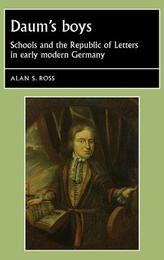
|
Daum's Boys: Schools and the Republic of Letters in Early Modern Germany
Hardback
Main Details
| Title |
Daum's Boys: Schools and the Republic of Letters in Early Modern Germany
|
| Authors and Contributors |
By (author) Alan Ross
|
| Series | Studies in Early Modern European History |
|---|
| Physical Properties |
| Format:Hardback | | Pages:256 | | Dimensions(mm): Height 234,Width 156 |
|
| ISBN/Barcode |
9780719090899
|
| Classifications | Dewey:943.04 |
|---|
| Audience | | Undergraduate | | Postgraduate, Research & Scholarly | |
|---|
| Illustrations |
Illustrations, black & white
|
|
Publishing Details |
| Publisher |
Manchester University Press
|
| Imprint |
Manchester University Press
|
| Publication Date |
1 April 2015 |
| Publication Country |
United Kingdom
|
Description
This highly original book is the first in-depth study of a footsoldier of the seventeenth-century German Republic of Letters. Its subject, the polymath and schoolteacher Christian Daum, is today completely forgotten, yet left behind one of the largest private archives of any early modern European scholar. On the basis of this unique source, this book portrays schools as focal points of a whole world of Lutheran learning outside of universities and courts, as places not just of education but of intense scholarship, and examines their significance for German culture. Multi-confessional Germany was different from Catholic France and Protestant England in that its network of small cities fostered educational and cultural competition and made possible a much larger and socially open Republic. This book allows us for the first time to understand how the Republic of Letters was constructed from below and how it was possible for individuals from relatively humble backgrounds and occupations to be at the centre of European intellectual life. This book is aimed at other specialists as well as postgraduate students in the fields of cultural and social history, and can also serve as an introduction to recent European literature on early modern scholarship for undergraduate students. -- .
Author Biography
Alan S. Ross is Postdoctoral Fellow in Early Modern History at Humboldt University, Berlin -- .
Reviews'Ross's book is a most welcome contribution to the early modern history of scholarship in Germany. Numerous histories of individual schools exist but - as far as I know - few are recent and none is as richly detailed or as engaging as this one. I think and hope it will inspire comparative research into other German schools of the same period and thus increase our understanding of their importance in the history of European culture.' Anna Carrdus, WBN 42 (2015) ' ... a treasury of local documents and assiduous research.' Paul F. Grendler, Renaissance Quarterly, September 2016 'If only we had more such studies as this.' Dirk van Miert, History of Humanities 'This is an important study ... immensely enriching.' Richard Kirwan, University of Limerick, Journal of the History of Education Society '[A work] that is as concise as it is gripping ... its main qualities: the richness of the archival records and the approach chosen by the author, the ambitious scope of the questions addressed and, finally, the book's great interest not only for the history of education but also for the history of the Republic of Letters and that of the Holy Roman Empire.' Sebastien Schick, Annales Histoire Sciences sociales '... a rich and skillfully-drafted study' Willem Frijhoff, Francia-Recensio 'Daum's boys" is a thoroughly-researched study and a comprehensive success all around ... It is an important contribution to the history of early modern education. Ross has cleared a path which will hopefully be followed by future historians ...' Alexander Winkler, H-Soz-Kult 'Ross has made wonderful use of the rich archival records and library left by Christian Daum to paint a detailed picture of early modern schooling and scholarship, and the links between them, in German-speaking Protestant Europe. He effectively traces the connections across civic, educational and scholarly communities within and beyond Zwickau. The charts, maps and photographs in this book, depicting subjects ranging from enrolment trends to early modern graffiti, effectively complement Ross' smoothly written analysis.' Valentina Tikoff, DePaul University, Illinois, USA, European History Quarterly, Vol. 47, No. 3 -- .
|